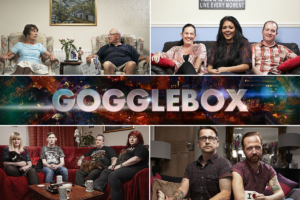Glen Creeber: Television has a potential to be more subversive because it comes to your home

INTERVIEW with TV theoretician Glen Creeber – KLÁRA FEIKUSOVÁ & MONIKA BARTOŠOVÁ –
Letní filmová škola might be primarily film festival but this year it got interested in television as well. When we saw Glen Creeber’s name in festival’s official program it was clear we have to talk to him. Glen Creeber is one of the most influential scholars who take interest in studying television nowadays. Interview was held after really interesting panel discussion about relationship between TV and cinema with Glen Creeber and director Viktor Tauš. Talking to Mr. Creeber was fun and really inspiring even if it rained for the last two questions and we had to hold an umbrella over our guest and recording devices. We really hope that LFŠ will provide us with more chances to meet interesting people from TV studies in future.
In the past the film directors often started their careers working for television. But today successful directors often migrate to television. The lure of television is understandable. It gives more space and time for plot and character development. But why it is happening so much lately?
Well, it is interesting that we have two forms – film and TV, yet traditionally two types of auteur.
In the film, the director is prioritized as the auteur, whereas in TV it is traditionally the writer. And that reflects the difference between media. As John Ellis says in his book Visible Fictions, the big screen is for spectacle. It’s about the visuals. Therefore the director is the man or woman in charge of the visuality. Whereas in television historically, it came out of theater and radio and the dialog was more important. And particularly because the sound was prioritized.
As John Ellis says, the visualities of small screen were smaller. And also people were distracted when watching TV. They might be talking, reading newspapers, and even be in another room, making a cup of tea or something. The sound would allure lot of attention. So the writer was the main author.
But the television has become more visual and cinematic. It is actually now a showrunner we prioritize. He is sometimes sort of creator, producer and might even direct and write episodes. And I think that directors realized that TV has become more visual medium which prioritizes director as an author like never before and it brings them new possibilities. The medium can be used in the ways it couldn’t be before. So it may be one of the reasons.
Speaking of other reasons. TV was downgraded and so if you were a film director and went to TV they assumed you were slowly working your way down in your career. It was the same way with the actors. You had people working separately for film or TV. That isn’t now. If you say you are director or actor and you say you work on a new TV show, it doesn’t have the same downgraded quality. So there has been a convergence for number of reasons.
This phenomenon certainly gives more power to the directors, because they often shoot all episodes, which changes dynamics in the production, since the director used to be less important in the television context before. Can we speak about an auteur TV? The same shift of power from screenwriter to director, as Truffaut described it?
Overshift is a big question and many books are being written about it. One of the reasons why films and TV shows have authors is to make them look like a work of art. A work of art, in the eighteen or nineteen century, was usually produced by a single author. The story would be written by single author. Whereas film, when it arrived in the cinema was not seen as a work of art but as an industrial process. And it was collaborating. When the cinema studies first arrived back in the fifties, when the film started to be discussed in more serious way, it was one of the reasons why they said “we’ve got to find an author”, I think. It was important to know who is the person we can label? And I think in a way, it is understandable, that it does the service to the production of film and TV, to label one person as the author.
I think it is better to see it as a collaborative medium, both of them. I think it’s lazy in terms of critics and academics to concentrate on one particular person.
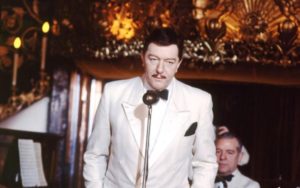
„I ask my students: ‚Who wrote The Singing Detective?‘ and they say: ‚Dennis Potter.‘ And when I ask who directed it, they have no idea. (…) It’s a crazy system. And if I was a writer in Hollywood, I’d be pretty upset.“
There is one example. I wrote a book on Dennis Potter, he was a television playwriter and he wrote the series The Singing Detective and directed by Jon Amiel. He would read reviews all the time saying “Dennis Potter’s Singing Detective” every time. And he got absolutely no recognition for it. Although after the success of it, it enabled him to have a career in Hollywood. The first film he made was Sommersby with Jodie Foster. He directed that and he did very well. He got huge praise for it. And he said: “It is crazy. I did The Singing Detective for the TV in the UK and nobody knew my name. And now I am praised as a fantastic auteur.” And he suggested that maybe both are wrong. That maybe somewhere in the middle is a collaborative process that needs to take place. And I wonder as an academic that maybe we should explore more in our writing and critique of both media.
I ask my students: “Who wrote The Singing Detective?” and they say: “Dennis Potter.” And when I ask who directed it, they have no idea. And I ask: “Who directed E.T.?” And they all goes: “Steven Spielberg!” “Who wrote it?” They have no clue. It’s a crazy system. And if I was a writer in Hollywood, I’d be pretty upset. But at least the director gets more priority in the TV nowadays and that’s good.
It is popular to divide TV in two boxes – quality TV and “not so good” TV (genres as sitcoms or soap operas). Is it analytically useful for TV studies? Is there such huge difference between the two? Are those categories “real” or is it more marketing strategy or way of establishing the television as high culture?
I have a real problem with the term “quality”. I think, particularly with television because it is such a multi-generic medium, there’s so many different genres. How can you compare The Sopranos with a morning breakfast talk show? I mean, it’s crazy.
The cross-generic comparison is very hard. As much as drama tends to be labeled quality, some genres have tendency not to be made branded quality, quite opposite. Like reality TV.
I think it’s really bad when people put down the whole genre. There are examples of quality reality TV shows. I think The Big Brother changed the landscape in terms of television. It was influential across genres. And I am big fan of reality shows, I watch them a lot. Constructed reality is really a new phenomenon and I want to write about it as an academic and figure out what’s going on there.
And also what we do when we say “it is a good show” we create canons. And it becomes, you know, “the best film ever made is Citizen Kane”. And popular films like comedies would be overlooked. So I think it is important that if you use the term quality then you must define what you mean very vividly so that people know exactly what your terms are.
I think sometimes quality can be a genre. So like we in Britain have a tradition of costume drama which are adaptations of classic novels. And everyone goes “oh, it’s quality TV” because they know it’s a branding. They cast British actors that really don’t work on TV, they tend to work on the stage and they bring cultural status with them. And so quality could be used in acting but I think you have to be very careful how you use it and define your terms very strongly and how are they applied in different genres.
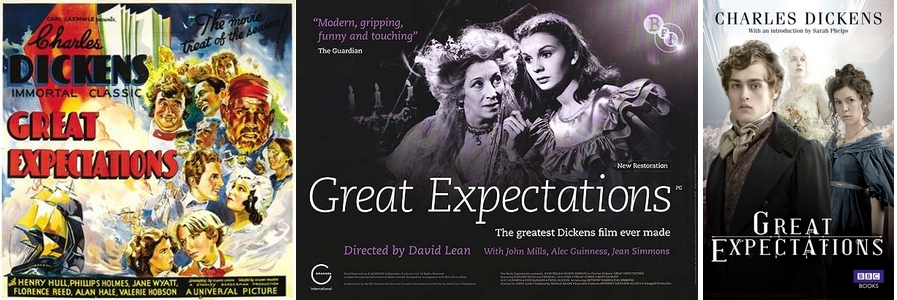
„Well, I don’t think Dickens was on the set. I don’t think he had much decisions when it came to costumes or the lighting.“
Maybe it is because quality categories come from different media – literature, theater, film – to television and they sometimes don’t make sense there.
Yes, I mean, every media would try to sell itself. For example you’ll see The Great Expectations as a costume drama and there would be big title “by Charles Dickens”. Well, I don’t think Dickens was on the set. I don’t think he had much decisions when it came to costumes or the lighting.
Of course, it’s based on that book but the reason they put it in the front is because people would think “well, I never read the book but this must be quality television, it got Charles Dickens on it and this will be easier than reading a book, so I’m having an education” when in fact you are watching a tv programme. Not that it can’t be educational, of course it can. So yeah, whatever works, whatever they will brand a piece of television in order to sell it, they will use. But as academics we must not be lazy and fall in that branding trap. We must stay outside and be analytical.
Isn’t the notion rather hurting the TV and TV studies?
Yeah, I mean I had really passionate, sometimes drunken, arguments with other academics who say “what’s wrong with telling students what’s quality?” And I say “because their quality is often very different from mine”. And the students are often from different generations. For me it doesn’t matter what show they talk about in their essays. The shows are sort of irrelevant for me.
Of course, they are relevant in some way, but it’s how they talk about television. That’s what I want to see. I want them to be critical about television. What show, what genre, whether it is quality in somebody’s terms or not is irrelevant to me. I want them to become critical. I think quality is a bit of a smokescreen that we could frankly do without in terms of academia. Leave it to journalists, they can be lazy, but we need to be critically rigorous.
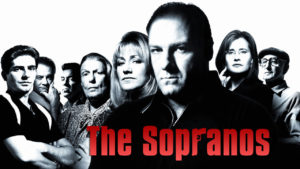
„The Sopranos are very cinematic. But at the heart of it, it’s a television story being told televisually – shot/reverse shot, lots of close-ups, people talking…“
There is lots of to talk about the cinematization of television. But I think maybe it’s all down to the technology. The technology allowed the TV to be more visual and the technological inventions such as VHS allowed for narrative to become more complex. But I don’t think the TV is necessarily trying to be cinematic. So maybe the “cinematization” isn’t the right term.
I think you might be right. If you watch a piece of TV and say “that was like cinema”, then put it on in the cinema. That’s not what the television show is about. Television now has the opportunity to be more of visual spectacle. Originally, the TV show was shot in the studio. In the early days it went out live because working with recording techniques was difficult and really expensive. So it was really filmed theater, that’s what early television drama really was. And new technology absolutely revolutionized that. Television can tell its story in a number of ways. But that essential televisuality is still much there, even in some of the most visually cinematic dramas. For example, The Sopranos are very cinematic. But at the heart of it, it’s a television story being told televisually – shot/reverse shot, lots of close-ups, people talking, it could be shot in the studio, lots of it is happening at home or on therapy sessions. And there are numerous examples. I think the best television now uses visuals and sound in equal measure rather than being heavily dialogued as theater may be.
I think the show everybody mentions as a big change is Twin Peaks. It’s undoubtedly cinematic. The pilot and other episodes were made by film director. In fact, in the beginning they weren’t sure that ABC would take it up. So they made it with idea that if ABC won’t buy it, they can make a film out of pilot. But let’s not forget how televisual Twin Peaks is. First of all, it is a murder investigation. It’s a police procedural and soap opera. It borrows its essential storyline “who killed Laura Palmer?” from a Dallas storyline “who shot JR?” It’s the same thing that came out just few years before. And also, somebody who gets neglected a lot, going back on authorship, is Mark Frost who was a writer of Twin Peaks. He is a TV writer who worked on a number of shows – Hill Street Blues, The Six Million Dollar Man. So it was really two minds, a collaboration between somebody from film and somebody from television. You can see both working together in that show. And that was the hybridity how it is formed. But it is very televisual despite being aesthetically the game changer.
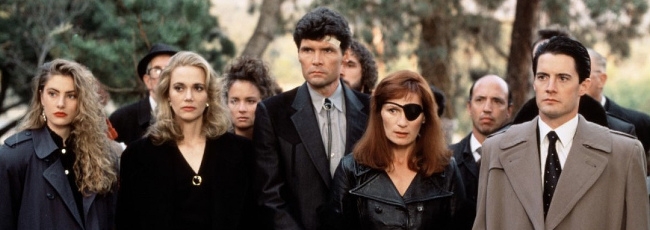
„But let’s not forget how televisual Twin Peaks is. First of all, it is a murder investigation. It’s a police procedural and soap opera. It borrows its essential storyline ‚who killed Laura Palmer?‘ from a Dallas storyline ‚who shot JR?'“
You are interested in the genres in the TV, you wrote books about it (The Television Genre Book, Serial Television: Big Drama on the Small Screen). At first, TV adapted processes from older media (literature, radio, film) but it later developed its own specifics. Doing classical genres from film, like western or horror, have the same rules in the cinema and on TV or are they different?
You mentioned western. Western was extraordinary popular on television during the 1950s in Britain and in America. But of course it was very different from the western that we see in cinema. John Ford‚s western is basically about spectacle. It’s about the wilderness and the American landscape dominates it. Whereas shows like Bonanza from 50s it was again about close-up and it was a soap opera set in a western town. It’s a historical soap opera in a way.
At that time the genres on TV and cinema were radically different. Although we would understand it as a western because it would have iconic motives such as horses and hats and saloon bars. So we knew it was western but they were fundamentally different.
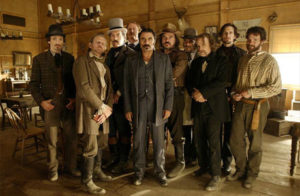
„You very rarely leave Deadwood, you very rarely leave the bar where Swearengen lives and swears all day long. It’s about the intimate world. A people mixing, a multi-narratives serialize the storytelling.“
But it was quite interesting that during sixties and seventies the western almost died out on TV. Because I think it couldn’t compete. I think it felt that it was offering something that was a bit like science fiction. The early TV tried to compete, Doctor Who tried to compete with Close Encounters of the Third Kind, it was ludicrous.
But what’s interesting in last few years we had Deadwood, the HBO series, which is just one of most visually stunning pieces of television you could ever see. And it takes all the ingredients of the cinematic western but again it’s really a soap opera set in a small town. You very rarely leave Deadwood, you very rarely leave the bar where Swearengen lives and swears all day long. It’s about the intimate world. A people mixing, a multi-narratives serialize the storytelling. So yeah, I think you can use the genres but you have to be particular about what medium is using it and how they may use it differently.
Do the same genres work differently on the big screen and on the smaller ones? Some work do perhaps better on the screen. And some might not work at all.
I think documentary is really interesting one. Somebody was saying to me the other day “There are some interesting documentaries on TV”. Are you joking? I mean, documentaries on film are rare, really. Try to name ten film documentaries. It might be quite difficult. And what we now see is serialization of documentary with Making a murderer that was just commissioned for second season. It’s quite interesting, based on real events.
But back on question. Reality television. Soap opera. Sitcom. They all come from radio. They are all serialized. It’s quite funny when you have a really successful sitcom and they turn it into film. And it sort of loses lots of its comedic effect. Because lots of sitcoms are about family, whether it’s real family or family of work colleagues, and there’s often a tension because they are stuck in a small space, it’s claustrophobic. And it works in two or three sets. But suddenly put them out to outside world and they lose their comedic claustrophobia and the tension between the characters.
So absolutely I think some genres work better on TV. We think of cinema mainly as a fiction. And then there’s not much of tradition. It’s getting stronger but there’s not much tradition of horror television. When I said that to Matt Hills he replied: “Yes there is and I want to write about it in the television genre book.” Unfortunately he didn’t manage to get it there but it will be in the next edition.
I think horror could actually work better on TV. Because when you watch horror at home, whether on TV in the living room or on your laptop, you disrupt that safe space that is your home. You bring the monster home.
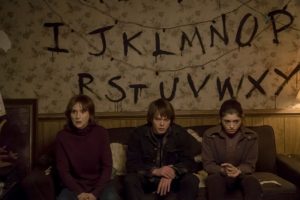
„But when you are watching the horror set in suburban area, in the house a bit like yours, and you switch the TV off and starts to walk upstairs, and you hear a creek, you’re gonna be very scared.“
Yeah, I think you’re right. In the cinema you have a companion of hundred people. And when the lights go up, the world is suspended. But when you are watching the horror set in suburban area, in the house a bit like yours, and you switch the TV off and starts to walk upstairs, and you hear a creek, you’re gonna be very scared. I think that this proves that idea that cinema and television are converging.
Yes, there’s a lot of that but they are not becoming the same thing. Even today with changes in technology, film and TV goes under very different criteria and they are still doing two very different things. Even though the crossover is clearly there and it can be seen easily.
Is it possible for the television to be subversive to communicate current topics or different points of view to broad audience? Or does the TV tend to be more conservative because it is still saw as a family medium?
I think television has a potential to be more subversive than cinema because it’s intimate medium. It takes people unaware. As we were saying about the horror, it comes to your home. You can use that to scare people or you can use that for subversive reasons. You can use it for political or ideological reasons. People will watch it in such a way and they will relate it very much to their own lives.
That’s why I think the soap opera is so popular. It’s set in the present day, when it’s Christmas, it’s also Christmas in your soap opera. It’s set in the present day, it’s about people that live like you. Soap operas don’t travel really well. We all have our national soap operas because we want people there talk like ourselves, living a life much like our own. Because we empathize and we feel we are part of that. And we know what they are doing and the culture they are living in. I think it sort of gets under your skin. And I think the television can get under your skin. It can become bland, it can become commercial but it has the potential to be radical and subversive.
Does it provide new space for changes on audiovisual forms and styles?
I think television has been quite conservative in the past in terms of narrative. I think it’s been quite traditional. It didn’t want to scare viewers. You don’t want viewers to switch off if they find it a bit odd. But I think as shows come out, they push the boundaries. People are expecting more. And I think audiences are becoming more media literate now. They want to be pushed. They want their stories to be complex. They want characters that reflect different attitudes, different cultures and different lifestyles that we all have. The idea of 1950s housewife home, “hello darling”, heterosexual white man, those days are over. Television has the potential to really reflect multi-cultural, multi-sexual, multi-anything in a way because of its serialization. Because it gets under the skin. Because it’s there, in your living room. And we watch it on the day to day. It influences people’s lives.

„I think television didn’t change how gay and lesbian were threated in society but I think it speeded up cultural history. It made those changes happen quicker than it would’ve done without television.“
I think to take gay and lesbian issues is interesting. I think television didn’t change how gay and lesbian were threated in society but I think it speeded up cultural history. It made those changes happen quicker than it would’ve done without television. And a simple example would the introduction of gay characters into a soap opera. As mainstream soap opera would be watched by a huge section of that population. And the controversy it brings in would be forgotten within a few weeks because they are embedded as characters and that enables real social changes. And television can do that in a way that other media would fine difficult.
The soap opera is often degraded as a poor quality. Yet it has a profound effect on the way we live our lives, it can be enormously radical and ideologically subversive. And also soap operas has changed quality television, if you wanna use that term, because they are now emulating them. In the early days it tended to be a single play but now they realized the narrative complexity, the multi-lead storylines and the serialization the people get involved with in soap opera can be translated to so-called “more serious” drama.
In your book Serial Television you speak about how the TV changed from political to psychological. The TV shows focus more on characters and their relationships. Is it why we are drawn to the TV shows? Are we looking for something to relate to, something more private, perhaps?
I think there’s been a general cultural shift that the personal has become political. Television is often degraded “oh it’s people falling in and out of love, having babies etc, there’s no political content in it”. But it’s the politics of everyday. I mean the homosexuality example is very good one.
That’s political agenda and its micro-politics but it’s politics that affect everyone. But also it makes them good drama. So you get your cake and eat it as we say in Britain. It can be radical and hugely entertaining. And it’s what great storytelling should do. Entertain people but make them think too.
The TV is also migrating and it migrates online. It certainly changes the viewing experience.
People say that the television is dead. But I think we are watching more television than we ever watched in our lives. Except that the thing we watch it on has changed. And that’s all. It always played a huge role but now it’s playing even bigger one.
Every time technology moves on we gain a lot but we sometimes lose a lot either. I think one of the things we lost with the advance of technology is watching as a shared nation. That was very important once upon a time. Whether it was a local soap opera or news that we all watched at the same time. I remember a friend of mine in the 80s, he said: “I’m gonna watch a film tonight, it’s a great film, it’s on ITV at nine o’clock, are you gonna watch it, Glen?” And I was standing by his bookcase and he had a video of the film there. So I said to him: “But you’ve got it there, you can watch it anytime!” And he said to me: “But I want to watch it live, with everyone else.” And it was the first time I realize the television has the ability to cement a nation.
But when you think about it, television is a talking point. Of course you also got your news from it and so on and so forth, however, television as a talking point- that may change. But I think even that has positives. Like I was saying that the TV may become more international. And maybe the countries that didn’t have great international influence would be able to have it too. So yeah technology has certainly changed things. There are advantages and disadvantages. And it goes on, you can’t stop technology, you know. But the television, to me, it’s still here. It’s just in a different form.
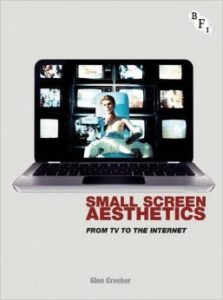 It’s quite interesting, because at the end of my book Small Screen Aesthetics, I didn’t originally intended to do it, I was just gonna write the television aesthetics, but I realized a lot of what we watch now we watch on a small screen.
It’s quite interesting, because at the end of my book Small Screen Aesthetics, I didn’t originally intended to do it, I was just gonna write the television aesthetics, but I realized a lot of what we watch now we watch on a small screen.
What’s interesting I wrote an article called “The Return of the Intimate Screen” and the point I was trying to make was as television has become more cinematic we lose something. We lose that talking heads, we lose the claustrophobia. If you watch an internet drama, made to be watched on a laptop or a mobile phone, it looks like early television. It’s talking heads and close-ups because they can’t do spectacles. So somehow the storytelling will find its heart wherever it’s on the tablet or the television.
Nowadays there is a plenty of serial audiovision online. Netflix or Amazon are producing their own shows directly for online watching. How to define what the TV is these days? Is it “the box” or a way of distribution? Do we lose the legendary “TV flow” or are we creating our own with binge-watching?
There are so many ways to watch television. And it’s true, we can watch it in so many different platforms but if you compare all those ways we can watch it whether it’s tablet or a box in the corner of the room, it’s intimate. It’s there in front of us, it’s not big screen. We watch it without the people around us.
When we watch it on tablet we watch it alone because it’s difficult to share but we have a virtual living room now. Because when you hashtag the show you’re talking to people all the time. Particularly with reality shows but also drama and so on. So the conditions have changed yet strangely enough the intimacy, the interaction has remained.
There’s a British show called Gogglebox and it’s basically people watching television. Which sounds really boring, doesn’t it, but it’s very lively and compelling. It’s what’s television is about. When you are in a cinema, you are told to shut up. Television is about sharing. Whether we do it in the living room or do it online, it’s still there. So the differences between the ways we watch it is smaller than difference between TV and other media like cinema.
How do you think the web changed relationship between media producers and their audience?
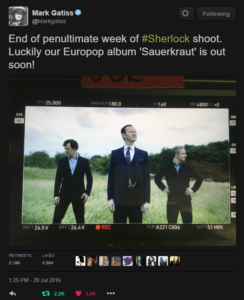
„Shows can get cancelled or survive depending on fans now. Of course on twitter, fans can immediately talk to creators of the show. I think the interactivity is something the cinema can never quite compete with.“
Oh god yes, enormously. And it all goes back to that sort of interactivity. The interactivity of television now is so great, that we can as a fanbase decide about certain characters whether they will live or not. And it certainly is gonna get more intense. There will be stories where we will be deciding what will happen, maybe through the texting or social media. Shows can get cancelled or survive depending on fans now. Of course on twitter, fans can immediately talk to creators of the show. I think the interactivity is something the cinema can never quite compete with. So I think interactivity of TV will lose in some way but gain more otherwise.
We talked about audience, that they make lots of content online about shows, they are reading and exploring them again. Is this a part of TV or is it something different?
That’s a good question. I’m not sure I know the answer to that. But you know, audiences reinventing the shows, it’s sort of extra-textual, they are a side of the text but nevertheless they are still part of the show. And they may well feed back into future season. I don’t know, but that’s always been a case what was always written about television, you get directors commentary on DVDs is that part of the show? I don’t even think it’s necessary to say ‚television is this‘. Television is many things. You can look at it historically, in terms of industry, in terms of audience, in terms of representation. Television studies is a huge field and every aspect of it needs to be explored, rather than just trying to reduce it to something that it’s not.
Back to the cinematization of TV. Isn’t it actually other way around? The TV has better visual and more complex narrative thanks to technological progress, it doesn’t actually tries to be film-like. But films on the other hand are becoming serial. The franchises are really popular. Take for example the Marvel universe movies.
We have a serialization of film now. Star Wars, Harry Potter, Lord of the Rings… Adaptation of books have always been done rather badly in films I would say, it’s a personal opinion, but the reason for that is the novels, say by Charles Dickens I mentioned, were released chapter by chapter as they were first published in magazines. So you had many cliffhangers at the end. They were episodic and serialized.
And yes I think part of that convergence – TV is learning from cinema and cinema is learning from TV – but what we do now is that we have a summer blockbusters which are trying to be more visually stunning. They are a rollercoaster ride, and it’s interesting that those superheroes books decided to go on screen. But you know we have Walking Dead and so on and so forth.
That reminds me, Walking Dead and interactivity, they have after show Talking Dead when they all get together. So yes there’s a convergence but that doesn’t mean they are somehow one and the same medium. They’re clearly not.
Television can be actually better for book adaptations.
Yes, it can do them the justice. And portraying history, you know, large historical narrative maybe about World War II it’s hard to compete with television. On film it would be different. The fact that we’re discussing television, the fact that television is still being studied, it’s testimony to huge impact it had on society. Bringing people together, making them think, making them talk, enriching their life and entertaining. Television needs to be taken seriously. And I’m glad to see the Czech Republic is finally bringing it to the university curriculum. Because it is an important subject and should not be dismissed.


